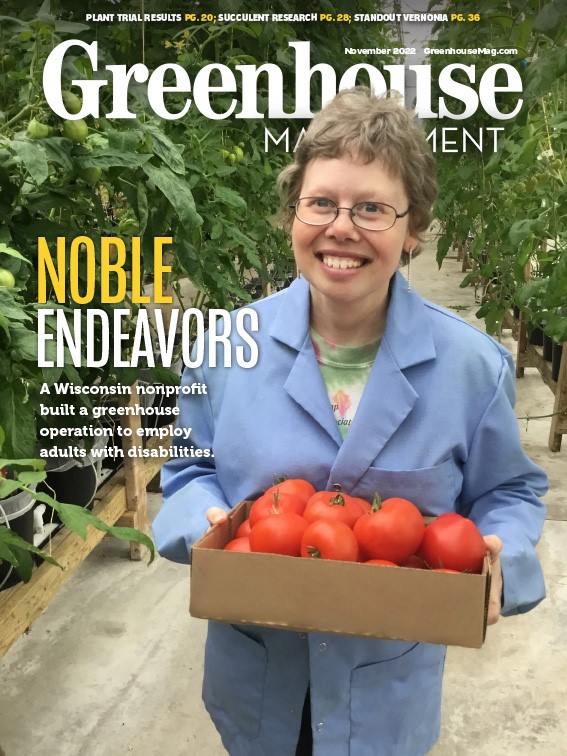

Greenhouse operations are struggling to find employees. From exploring options like employee referral incentives and hiring bonuses to attempting to hire people from outside the horticulture industry, growers are trying whatever they can to fill their greenhouses with workers. Growers may be able to learn a lesson from one operation in Wisconsin.
Based in Balsam Lake, Wisconsin, the Endeavors Adult Development Center, a nonprofit organization for adults with disabilities, operates a greenhouse in nearby Milltown, Wisconsin that employs their clients. While Endeavors was established in 1965 as the Polk County Adult Development Center, the greenhouse facility is a recent effort, established with support from the USDA and the local government.
The city of Milltown was instrumental in the development of the greenhouse, donating 5.74 acres to Endeavors for the operation. Today, they have two energy-efficient greenhouses that are each about 5,800 square feet.




“The north side is used for growing our vegetable and annual flower plants for retail, and the south side is where we grow our hydroponic tomatoes,” says Leslie Larson, executive director of Endeavors Adult Development Center. While Larson runs Endeavors as a whole, the greenhouse program is overseen by Lynn Lusson, the greenhouse coordinator. Lusson has a background in caregiving, retail, and greenhouse production, and she owned her own flower shop for 12 years.
Endeavors also features a retail store where they sell what they grow, along with wild bird seed and items made by local crafters. Endeavors also sells their crops to the local Unity School District, a local natural alternative food store and to local farmers markets. People can also place wholesale orders via phone call.
Lusson has “taken the greenhouse to new heights within this last year with learning as she goes, along with support of her staff and participants,” Larson says.



The greenhouse uses a hydroponic growing system. “We use ProGreen Plus Growers mix, a soilless mix that is a mix of southern pine bark, Canadian sphagnum peat moss, perlite, vermiculite and dolomitic lime,” Larson explains.
The greenhouse was established in 2011 to help adults with disabilities “participate and thrive in their communities and to reach their highest level of independence by promoting personal growth and providing meaningful employment opportunities,” says Larson. “The goal was to create a space that could provide skills, training and employment for individuals with disabilities while generating money to cover the operating and training expenses.” The training and employment includes planting seeds and plugs, daily care for the plants, and daily pruning and harvesting of vegetables.
Several Endeavors employees have gone on to work at other greenhouse operations.
“Endeavors’ purpose is to give all participants the work skills needed to work out in the community, and to find employment anywhere they may choose,” Larson says. “Some would like to stay at Endeavors, but we are just the steppingstone to their community integration into the workforce. We work with them to provide the skills they need to help them succeed.”
This community integration is key, as Larson and her colleagues want their clients to be able move beyond the center and work and live independently. So even outside of an environment specifically designed for workers with disabilities like Endeavors, their clients can take their skills to any operation.
Other greenhouse operations can learn from Endeavors. “You seriously could not find more dedicated employees than our participants,” Larson says. “They put all they’ve got into everything they do and take great pride from start to finish with all jobs. They just need people to give a chance for them to try. They should not be labeled for their disabilities, but labeled as hard workers that want to make a difference each and every day with what they do. Everyone has an ability to strive, and given the chance, you would be as amazed as we are each and every day with our participants.”

Explore the November 2022 Issue
Check out more from this issue and find your next story to read.
Latest from Greenhouse Management
- Chilli thrips (Scirtothrips dorsalis)
- GS1 US Celebrates 50-Year Barcode 'Scanniversary' and Heralds Next-Generation Barcode to Support Modern Commerce
- University of Florida offers Greenhouse Training Online program on irrigation water
- Flower trends in full bloom
- ‘Part of our story’
- Dramm introduces new hose, sprinkler attachments for home gardeners, nurseries
- Nominate an outstanding leader
- Profile Products hires sales and business development manager for Europe and Asia





